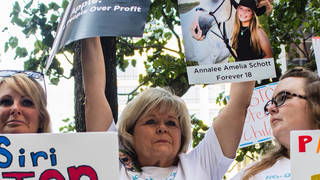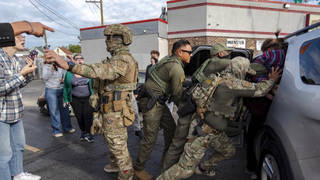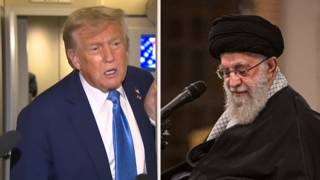
Guests
- Trita Parsiexecutive vice president of the Quincy Institute for Responsible Statecraft.
- Gideon LevyIsraeli journalist with Haaretz.
Israel has launched a large-scale military attack on Iran, killing top military officials, nuclear scientists and civilians in the deadliest attack on the country in decades. Iran has launched drones at Israel in response. The unprovoked attack, which Israel described as a “preemptive strike,” comes just days before scheduled nuclear talks between Iran and the United States. Iranian-born analyst Trita Parsi says the Trump administration appears to have been coordinating with Israel for “negotiating leverage” in an attempt to force Iran to “capitulate” on nuclear disarmament. Whether this gambit will succeed remains to be seen, though Parsi and Israeli journalist Gideon Levy say Israeli Prime Minister Benjamin Netanyahu is betting it does not. Netanyahu has long indicated a willingness to wage war with Iran and likely hopes to draw the United States into a major regional conflict. “This was the project of his life,” says Levy.
Transcript
AMY GOODMAN: Israel has launched a major military attack on Iranian nuclear and military capabilities, killing dozens of top military officials and scientists, along with civilians. At least 200 fighter jets have struck over 100 targets across Iran, including Iran’s main uranium enrichment site in Natanz and a nuclear research site in Tabriz. Strikes have also been reported across Tehran, the Iranian capital. The Israeli Prime Minister Benjamin Netanyahu has said the strikes will continue “for as many days as it takes.”
PRIME MINISTER BENJAMIN NETANYAHU: Moments ago, Israel launched Operation Rising Lion, a targeted military operation to roll back the Iranian threat to Israel’s very survival. This operation will continue for as many days as it takes to remove this threat.
NERMEEN SHAIKH: [inaudible] include Iran’s top military and nuclear leaders, including Hossein Salami, commander-in-chief of the elite Islamic Revolutionary Guard Corps; Mohammad Bagheri, chief of staff of Iran’s Armed Forces; and Ali Shamkhani, a close aide to Iran’s Supreme Leader Ayatollah Ali Khamenei. Nuclear scientists Mohammad Mehdi Tehranchi and Fereydoon Abbasi have also been killed.
Iran’s foreign affairs minister has said the country has a, quote, “legal and legitimate right to respond.” It’s been reported Iran has launched at least a hundred drones towards Israel that are being intercepted.
U.S. Secretary of State Marco Rubio claimed the U.S. was not involved in the strikes, while Trump posted on social media, quote, “I gave Iran chance after chance to make the deal.” The Israeli attacks came as the U.S. and Iran have been engaged in talks over a possible new nuclear agreement.
We’re joined now by two guests. In Tel Aviv, Gideon Levy is an award-winning Israeli reporter and columnist for the newspaper Haaretz and a member of its editorial board. His latest book is titled The Killing of Gaza. And in Washington, D.C., Trita Parsi is the executive vice president of the Quincy Institute for Responsible Statecraft and the author of several books, including Losing an Enemy: Obama, Iran, and the Triumph of Diplomacy.
Welcome back to both of you on Democracy Now! Trita, let’s begin with you. Your response to these extraordinary attacks by Israel on Iran?
TRITA PARSI: So far, it clearly seems that the Israelis have been successful in achieving early stages of what they want, which is to take out much of Iran’s command, and having killed several senior military officials. When it comes to damage to the nuclear program, the attacks against Natanz are one thing, and that’s a facility that is no more than 10, 20 meters underground. There’s not been any attacks against Fordow, which is about 800 meters underground. And that is something that it does not appear that the Israelis have the military capacity to take out through bombardment and maybe other avenues that they will pursue, and perhaps even the U.S. does not.
But what I think is increasingly clear in all of this is that this was not an act of defiance by Netanyahu against Trump, but rather the Trump administration and Trump himself was coordinating this with the Israelis in the hope, apparently, for Trump, thinking that this will actually soften the Iranian negotiating position and enable him to get a deal in which the Iranians capitulate. It remains to be seen whether that is the case. I suspect that the Israeli hope, however, is that the Iranians don’t capitulate, that they strike back, and, by that, get the U.S. to get more actively involved in the war.
AMY GOODMAN: So, Trita, can you talk about the significance of who has been killed?
TRITA PARSI: So, you know, several of the top people: the head of the Air Force, the head of the missile program, the former head of the nuclear program. Several of their predecessors had also been killed in assassinations by the Israelis, none of them at this scale and at the same time. And this, at a minimum, is going to delay an Iranian response to Israel, because so much of the top command essentially is gone. Whether they can actually reconstitute it remains to be seen.
But in that sense, the Israelis have pursued exactly the same game plan that they had with Hezbollah, and it appears that the Iranians have learned nothing from that, because that’s what the Israelis did in Lebanon. They went after the top ranks. And by that, they made sure that much rest of the organization was not capable of striking back or fighting. And once that happened, the Israelis intensified their bombings, which is probably what will happen in this case, as well. Once they feel that the Iranians are essentially incapable of responding, they’re going to do everything they can take out as much as possible of Iran’s military capabilities, conventional or nuclear.
AMY GOODMAN: So, you have this tweet of President Trump this morning where he says, “Two months ago, I gave you two months.” If you can talk about what’s going on at the negotiation level, the fact that the negotiations were supposed to be continuing on Sunday — will that be happening? — and the level of infiltration of Iran by Israel, what this means to hit so many, to kill so many of the top leadership in Iran, not to mention if you can talk about the significance of Natanz and these other nuclear and military sites that have been hit?
TRITA PARSI: Well, the significance of what has happened at the negotiating table is that originally the Trump administration entered these talks with the red line of only seeking no weaponization. And with that red line, a deal could be made, because it would mean restricting the Iranian nuclear program, but not eliminating it. The Iranians have agreed to that in the past. They have signaled clearly that they would agree to it again.
Something happened, though, and Trump then shifted his position towards zero enrichment, which is the Israeli position, the same position that John Bolton and Mike Pompeo argued for in the previous Trump administration. This then caused a deadlock in the negotiations, predictably, and it appears that that then opened up the pathway for the Israelis to convince Trump that what he needs to do is to allow Israel to go in militarily, with the help of the United States, in order to essentially soften the Iranian nuclear — the Iranian negotiating position.
I doubt that there will be any talks on Sunday. I think the Israeli calculation is to hope that there won’t be any negotiations going forward at all, the Iranians respond, and then, by that, making sure that the U.S. enters the war much more fully and openly than what it has been so far.
NERMEEN SHAIKH: We, Gideon Levy, we’re speaking to you in Tel Aviv. If you could tell us, you know, what the mood is there, Israel? A state of emergency has been declared in Israel. Additional attacks from Iran are anticipated. What is happening there? What are you hearing?
GIDEON LEVY: It’s a very intensive emotional mixture. On one hand, there is the fatigue of the last 20 months in which Israel is attacking Gaza on a daily basis, and many soldiers are there, the war against Hezbollah in the north. People are sick and tired. On the other hand, the James Bond sentiment wakes up now to see all those military impressive achievements. Nobody can deny those are impressive military achievements. And this gives some pride to Israelis. Israelis like it very much. Israel is, as you know, quite a militaristic society. And those achievements, killing here and destroying there, without any casualties, obviously, until now, it’s a great achievement.
But nobody pays attention to the price, the potential price, the possible price, which none of us know what will it be. And above all, there is no very clear answer: Where are we aiming to? Will we bomb every second year another location somewhere in the Middle East, and by this, Israel will continue with the same policy, the same strategy, living on the sword forever? Can’t tell you. But right now people are very proud of what happened, and very worried from the — from the retaliation, which might come any moment.
NERMEEN SHAIKH: And, Gideon, what about your response — you know, there has been some speculation that this, these attacks, and indeed the success of these attacks, in terms of hitting the targets that were presumably chosen, that this will actually bolster Netanyahu’s position within Israel, in a way that now whatever support for him was dwindling because of his — you know, the continuing assault on Gaza and the Israeli hostages not having been released, all of them.
GIDEON LEVY: You see, we are in a very, very early and preliminary stage. What looks now as a phenomonic, phenomenal success might turn into a fiasco within hours or days or weeks or months. But right now I’m sure that Netanyahu is much more appreciated than yesterday in Israeli society. I give him the credit. He didn’t do it only for domestic politics. This will be unfair to say. But his rivals are many, and I’m one of them, obviously. But this was the project of his life in the last 20 years, and now he really implemented it. We should be very careful in judging it, because, as I said, it’s too early. But, obviously, right now he is really at his peak in popularity, even though there were no votes yet. But sure, what he’s done, what he had done until now, will add him a lot of support in Israeli public opinion, no doubt about it.
AMY GOODMAN: We’re trying to determine, Trita, if the chief Iranian negotiator for the nuclear deal has been killed or severely injured. We’re talking about Ali Shamkhani. It looks like he has been killed. He was former head of the Iranian National Security Council. Can you talk about the significance of this?
TRITA PARSI: So, he has been killed, as I understand. And he was not the chief negotiator, but he was the chief of the negotiating committee that was coordinating the negotiations between the negotiating team and the supreme leader’s office. He’s a long-standing figure within the Iranian regime of Arab background. And the fact that he was targeted is also further indication that the Israelis were not trying to enhance the negotiations, but rather force either capitulation or an Iranian response that would bring the United States into the war more fully.
AMY GOODMAN: And what are the concerns you have about a wider regional war?
TRITA PARSI: Well, I mean, the concern that existed before, of course, was that this would lead to a major escalation in the region, particularly if some Arab states were allowing the United States to use its bases to support the strikes against Iran, which then would likely lead to Iran striking those countries. Oil prices would go up. Flow of traffic through the Strait of Hormuz would go down dramatically. And we would potentially see major destabilizations throughout the region. It’s not clear whether it’s going to go in that direction, particularly if the Iranian ability to respond has been significantly limited by these strikes. And again, we don’t know yet, because this picture is not sufficiently clear. At a minimum, it will delay a potential response, but it could also make sure that the response is not at all what it could have been or what many expected it would be, including inside the U.S. government, earlier on.
NERMEEN SHAIKH: And, Trita Parsi, you said earlier that the Iran-U.S. talks that are scheduled for this Sunday, June 15th, with Oman’s foreign minister and U.S. mediator Steven Witkoff, you don’t expect them to go ahead, though indications from the Trump administration seem to be at the moment that they will go ahead. What do you think?
TRITA PARSI: Well, the Trump administration is saying that they want it to go ahead, but whether it goes ahead or not depends on whether the Iranians show up. And again, I think the Trump administration is trying to use these strikes as, essentially, negotiating leverage. The question is if it will work out that way or if it actually will prompt the Iranians to significantly harden their position, potentially walk out of the NPT, kick out the inspectors and move towards weaponization. There’s a lot of different — the spectrum is quite wide there, but I suspect that it is quite unlikely that there will be any talks on Sunday.
And I also wonder where the Omanis are in all of this, because they probably feel a bit embarrassed, because they have done a very good-faith effort to actually negotiate a deal, but they agreed to that mediation because of confidence that both sides are serious about a deal. It’s not so clear any longer as to whether the Omanis or anyone else would be serious about thinking that the administration actually is looking for a deal.
NERMEEN SHAIKH: [Gideon Levy], finally, you told CNN earlier today that this would be catastrophic for Gaza, because now all the focus will shift to Iran, and the starving, dying children of Gaza will be forgotten. If you could say a little more?
GIDEON LEVY: You indicated me?
NERMEEN SHAIKH: If you could say a little bit more?
GIDEON LEVY: Yeah.
NERMEEN SHAIKH: Do you see that —
GIDEON LEVY: Yeah, yeah, sure, sure. I didn’t know you were aiming it at me. Sure. I was asked in CNN and other places. And I think this is very important, because the world’s focus will now be only on Iran, and Gaza will stop, will be totally forgotten. And Gaza is still a location of bloodbath, a terrible, terrible reality, as I don’t have to tell your viewers. But this continues. By the time we talk now, there were over 100 people killed only in the last 24 hours in Gaza. This will continue now. And if the world will focus only on Iran, this slaughter will continue day after day, and the suffer is unbearable. And we shouldn’t forget Gaza, even though Iran is now the main focus. But let’s not forget Gaza, because Gaza is really starving and dying, and the suffer should stop at once. I wish Donald Trump would be more involved in Gaza and, if Israel now has the success in Iran, at least stop the war in Gaza. At least make a ceasefire, and without even any conditions, because the reality there is really inhuman, criminal and unbearable, and we shouldn’t forget Gaza.
NERMEEN SHAIKH: Trita Parsi from the Quincy Institute for Responsible Statecraft, and Gideon Levy, Israeli journalist and Haaretz columnist, thank you both for joining us.
Coming up, Congressmember Ilhan Omar on President Trump’s widening crackdown on immigrants and protesters. Stay with us.
[break]
NERMEEN SHAIKH: “I Ain’t Got No Home in This World Anymore,” a rendition by Billy Bragg in our Democracy Now! studio.













Media Options